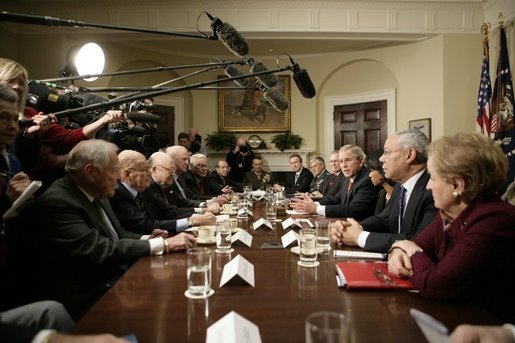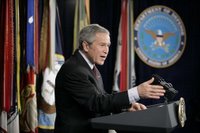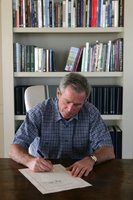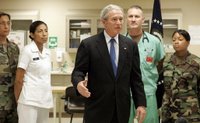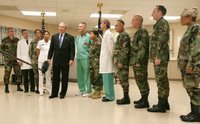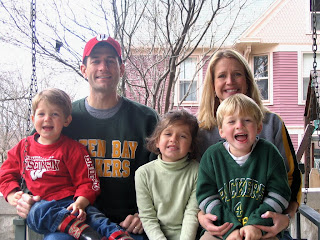Department of Justice Press Conference on Jack Abramoff FULL STREAMING VIDEO, (1/3/2006)
Department of Justice Press Release on Jack Abramoff (1/3/2006), Former Lobbyist Jack Abramoff Pleads Guilty to Charges, Involving Corruption, Fraud Conspiracy, and Tax Evasion
WASHINGTON, D.C. – Former lobbyist Jack A. Abramoff has pleaded guilty to a three-count information charging him with conspiracy, aiding and abetting honest services mail fraud, and tax evasion, Assistant Attorney General Alice S. Fisher of the Criminal Division announced today. Abramoff, 47, entered his plea today in U.S. District Court in the District of Columbia, before Judge Ellen Segal Huvelle. Under the terms of a plea agreement, Abramoff faces up to 30 years in prison, a fine of more than $750,000 and mandatory restitution estimated to be approximately $26.7 million. Abramoff has agreed to cooperate with law enforcement officials in an ongoing criminal investigation. Abramoff’s former business partner, Michael Scanlon, previously pleaded guilty in this investigation and is cooperating with law enforcement officials. According to the plea agreement signed by Abramoff, from 1994 through early 2004 he was employed in the Washington, D.C. offices of two law firms. During this time, Abramoff lobbied public officials in the federal government, principally members of Congress.
He also sought to further his client’s interests through grassroots work, public relations services and election campaign support. The information charges Abramoff with receiving undisclosed kickbacks from Scanlon, who owned and operated Capital Campaign Strategies, LLC (CCS). Abramoff and Scanlon conspired to defraud four Native American Indian tribes that either operated or were interested in operating gaming casinos. Each of these four clients, which were tribes located in Mississippi, Louisiana, Texas, and Michigan, hired Abramoff through his employers to give advice regarding how best to limit competition from competing casinos or, in one instance, to re-open a previously closed casino. Once Abramoff had established a relationship with the tribal clients, he recommended Scanlon and CCS as the primary provider for grassroots work and public relations services.
As Abramoff and Scanlon knew, the clients relied on Abramoff’s recommendation because of his expertise in these matters. As part of the scheme described in the information and plea agreement, Abramoff and Scanlon charged fees that incorporated huge profit margins and then split the net profits in a secret kickback arrangement. As both men knew, the secrecy of the kickback arrangement was crucial to the success of their scheme, and Scanlon and Abramoff concealed the arrangement from the tribal clients. Scanlon also formed other companies which were used essentially to receive funds from clients for work performed by CCS and others.
Abramoff also admitted that as one means of accomplishing results for their clients, he, Scanlon, and others engaged in a pattern of corruptly providing things of value to public officials, including trips, campaign contributions, and meals and entertainment, with the intent to influence acts by the public officials that would benefit Abramoff and Abramoff’s clients. For example, Abramoff and Scanlon provided things of value to a public official (described as Representative #1) and members of his staff, including, but not limited to, a lavish trip to Scotland to play golf on world-famous courses, tickets to sporting events and other entertainment, regular meals at Abramoff’s upscale restaurant, and campaign contributions for the Representative, his political action committee, his campaign committee, and other political committees on behalf of the Representative. At the same time, and in exchange for these things of value, Scanlon and Abramoff sought and received the Representative’s agreement to perform directly and through others a series of official acts, including but not limited to agreements to support and pass legislation, and agreements to place statements in the Congressional Record.
Count Two of the criminal information charged Abramoff with aiding and abetting honest services fraud for arranging with a Texas Indian tribe to solicit another Indian tribe to mail a $50,000 payment, in order to assist Abramoff in paying for the golf trip he offered and provided to Representative #1 and some of his staff members. As stipulated in the agreement, through Abramoff’s scheme with Scanlon as well as several frauds he committed with others not including Scanlon, Abramoff received approximately $25 million in undisclosed criminal kickbacks and other fraudulently obtained funds. The tax evasion charge stems largely from Abramoff’s failure to report and pay taxes on income payments which he attempted to hide by causing them to be sent instead to certain non-profit entities that he controlled. Abramoff used the unreported income for his personal benefit and to carry out the fraud and corruption schemes described in the plea agreement and information. Abramoff also admitted that, in order to carry out his tax evasion, he caused others to prepare false invoices and false entries in books and records of certain non-profit entities and he caused them to file false reports with the Internal Revenue Service. Through this conduct, Abramoff evaded payment of approximately $1.7 million in federal income tax from 2001 to 2003.
“Government officials and governmental action are not for sale,” said Assistant Attorney General Fisher. “The Justice Department will aggressively investigate and prosecute these types of cases, which have such a devastating impact on the public’s trust of the government. We will not shy away from this responsibility.”
“Today’s plea is the result of determined efforts by United States investigators and attorneys working to vindicate the trust the American people deserve to have in the institutions of their government, including the tax system that supports it,” said Eileen J. O’Connor, Assistant Attorney General for the Tax Division. “People who enrich themselves by engaging in illegal activities compound their crimes by failing to pay taxes on their ill-gotten gains.”
“Beyond the illegal evasion of $1.7 million in taxes owed, one of the most disturbing elements of this whole sordid story is the blatant misuse of charities in a scheme to peddle political influence,” said IRS Commissioner Mark W. Everson. “At the IRS, one of our four service-wide enforcement priorities is deterring abuse within tax-exempt entities for tax avoidance or other unintended purposes.”
“Today’s pleas are not a victory, but rather milestones in ensuring that our citizens are indeed provided honest government services,” said FBI Assistant Director Chris Swecker of the Criminal Investigative Division. “This has been a lengthy and exhaustive investigation involving multiple FBI Field Offices, the Internal Revenue Service, and Inspectors General of the Department of Interior and General Services Administration. Protecting the interests of our government processes is the number one criminal priority of the FBI.. No criminal resources of the FBI will be spared in support of this important mission. ”
The Inspector General for the Department of the Interior, Earl E. Devaney, said, “As a partner in this task force for over two years, our focus has been on ensuring the integrity of both the Department’s programs and the officials who oversee them. To the extent that Mr. Abramoff can shed light in this regard, we welcome today’s events.” This case is being prosecuted by Trial Attorneys Mary K. Butler and M. Kendall Day of the Public Integrity Section, which is headed by Chief Noel L. Hillman; Guy D. Singer and Nathaniel B. Edmonds of the Fraud Section, which is headed by Acting Chief Paul E. Pelletier; and Stephanie D. Evans of the Tax Division’s Southern Criminal Enforcement Section, which is headed by Chief Bruce M. Salad. The case was investigated by various law enforcement agencies, including Special Agents of the Federal Bureau of Investigation, Internal Revenue Service Criminal Investigation Division, General Services Administration Office of Inspector General, and the Department of the Interior Office of the Inspector General. Abramoff has also been indicted by a federal grand jury in the Southern District of Florida. The Miami prosecution is being handled by U.S. Attorney R. Alexander Acosta and Assistant U.S. Attorneys Lawrence D. LaVecchio and Paul F. Schwartz.
### 06-002 FOR IMMEDIATE RELEASETUESDAY, JANUARY 3, 2006 USDOJ.GOV
more at Alberto Gonzales or Jack Abramoff and Attorney General or Department of Justice and Alice S. Fisher or Lobbyist and Abramoff
Related: Keywords Attorney General Alberto R. Gonzales, Wednesday, November 23, 2005 Attorney General Gonzales on Jose Padilla (VIDEO), Friday, February 25, 2005 Alberto R. Gonzales priorities of Justice, Friday, March 11, 2005 ALBERTO R. GONZALES ON THE AL-MOAYAD AND ZAYED CONVICTIONS, Monday, April 18, 2005 Operation FALCON, Sunday, April 24, 2005 DRAM CONSPIRACY, Wednesday, July 06, 2005 ATTORNEY GENERAL GONZALES TRAVELS TO BAGHDAD
